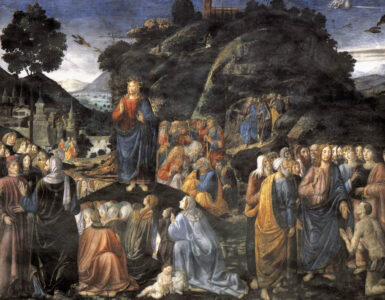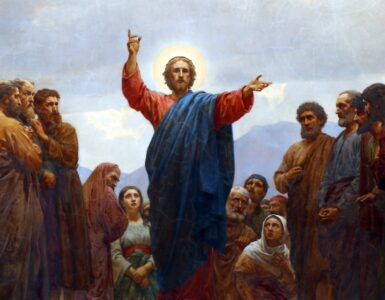Since my last essay was about Jesus’ Last Sermon, I thought it would be fitting for me to explore His First Sermon, which is better known as The Sermon on the Mount. It includes some of the most quotable sayings in the Gospels, such as the Beatitudes and the most common versions of the Lord’s Prayer.
While its site has not been officially determined, many have simply called it the Mount of the Beatitudes. Other possible locations were Mount Arbel and the Horns of Hattin. Mary Fairchild’s online essay,What are the Beatitudes, answers that question. They are a series of sayings, likened to reading the Psalms. One can find them in Matthew 5:3-12 and paralleled in Luke 6:20-23.
Jesus’ early ministry involved several miracles, the excising of countless demons and some teaching. By that time, Jesus had gained quite a large following. For His first sermon, He addressed a diverse crowd of devout followers, which also included the curious and those who came in search of physical healing from all over Judea, Jerusalem, Tyre, and Sidon. Others had come to hear Him preach. When Jesus saw the vast crowd gathering, He went to a nearby mountainside and prayed all day and night.
When morning came, Jesus summoned his disciples to Him, sat them down on the mountainside and began teaching them within the hearing of the massive crowd. He began with eight statements correlating, blessings, instructions and promise, which became known as The Eight Beatitudes.
Jesus’ initial sermon was a revelation to His followers then and now. It has been said that Jesus used the Beatitudes to teach all of us how to live with the Kingdom of God in mind. But caution was necessary because this sermon is not simply a list of set rules for us to follow. The basic rule for true discipleship was to live our lives through the spirit of Jesus, rather than merely following the letter of His law. Consequently, His sermon was a divine invitation for us to live under grace and experience blessings and rewards from the living Christ.
Fairchild tells us in her introduction that the word beatitude comes from the Latin, beatitudo, meaning blessedness. Each one of the eight Beatitudes speaks of a blessing or a divine favor God will bestow on a person, holding a special character quality or essence. While the message was easy to understand, it contradicted virtually everything the spiritual leaders were teaching in those times. I see this as a part of Jesus’ plan to replace the Old Testament with His New Testament of revolutionary teachings about salvation and the opening of the Gates of Heaven.
During His opening lines, Jesus invokes the phrase Blessed are eight times. This implies a current state of happiness or well-being. According to Fairchild, this phrase holds the powerful meaning of divine joy and perfect happiness to the people of Jesus’ times. In other words, Jesus was telling His followers that divinely happy and fortunate are those who possess these inward qualities. While Jesus’ words spoke to a current blessedness, they also promised future reward.
There also has been a great deal of discussion and interpretation of the Beatitudes for many years. Some great teachings have arisen from these discussions. According to Fairchild each beatitude is filled with a proverb-like saying packed with meaning and worthy of study. Most Biblical scholars tell us that the Beatitudes provide us with a good picture of what the true disciple of Jesus might look like.
In another essay Fairchild describes Discipleship as defined in The Lexham Cultural Ontology Glossary as the process of training people incrementally in some discipline or way of life. I prefer the second definition. To be a true disciple of Jesus we all must strive to be Christ-like in all our actions and relationships with everyone we encounter in this life. The challenge to do this can be very difficult because of all the snares of the world, the flesh and the devil which militate against us every step of the way.
As for understanding individual Beatitudes, I have also consulted Annette Griffin’s excellent commentary in Bible Study Tools, entitled, The Beatitudes: List and Verse Explained. The Beatitudes introduce and also set the tone for Jesus’ Sermon on the Mount by emphasizing His followers’ humble state and God’s righteousness. Each one reveals the ideal inner disposition of a citizen of God’s kingdom in its idyllic state, as the believer experiences abundant spiritual blessings.
The First Beatitude: Blessed are the poor in spirit for theirs is the kingdom of heaven. There are two concepts here. The poor in spirit refers to a spiritual condition of poverty by describing those who understand their need for God. His followers are also aware that they are spiritually bankrupt apart from Jesus and His teachings. The kingdom of heaven refers to people who recognized God as their King.
For centuries, the Jewish people had relied on their own spiritual integrity to fulfill the laws of Moses. The problem was that after the introduction of sin into the world, that task proved impossible. The laws given to Moses, namely the 10 Commandments, were designed to bring mankind to the understanding that humans possessed no inherent goodness of their own and thus had no ability to draw closer to a Holy God apart from them.(Romans 7)
Jesus’ sermon provided His audience with the keys to the Kingdom of Heaven by first prescribing the only means by which the spirit of man could be revived. To be saved, the poor in spirit had to encounter that deep sense of spiritual destitution and accept their nothingness before God. This virtue is the opposite of the King of Sins, the deadly sin of Pride, as illustrated by the Pharisees. There must be an emptiness, or what psychotherapist, Viktor Frankel, a survivor ofAuschwitz, called an existential vacuum with which God could fill with His love and hope.
The Second Beatitude: Blessed are those who mourn, for they will be comforted. This has been interpreted as people who express deep sorrow for sins they have committed and repent from their sins. They enjoy a freedom found in this forgiveness and the expected joy of eternal salvation in the comfort of those who have also repented. Jesus’ audience were no strangers to mourning. They had suffered great tragedies and hardships as a people. They knew what it was to mourn and practice ceremonial mourning. Jesus taught them that the ultimate mourning, due to sin, caused an alienation from God and was the worst mourning of all.
All such mourning can be traced directly or indirectly to sin. Only when we acknowledge the mournful state of our sinful hearts can we find the comfort of our Redeemer. Our Godly sorrow will lead us to repentance and contrition. Personally, I have always taken Blessed are those who mourn…to be about people who have lost loved ones and good friends and were experiencing a great sense of grief for their loss.
The Third Beatitude: Blessed are the meek for they will inherit the earth. Like the poor, the meek are those who submit to God’s authority and make Him their Lord. As Revelations 21:7 says all God’s children will inherit all things. The meek are also imitators of Jesus, who was the paragon of gentleness and self-discipline. In more direct English, I think it means His faithful disciples will enjoy the world of happiness He has prepared for us since before we were born.
The Fourth Beatitude: Blessed are those who hunger and thirst for righteousness for they will be filled. Hunger and thirst speak of our deep need and driving passion for righteousness, which can be described as a deep-seated longing to be with Jesus when our time has expired on this earth. To be satisfied means that Jesus will sate all of our soul’s deepest desires.
These words were perplexing to many in the crowd. Jesus was speaking to a multitude whose world was one of where Caesar ruled with and iron hand and whose armies had invaded their lands. Jesus’ words were out of touch with the only world they had known. In a culture where rights were everything and pride was a virtue, this brand of meekness seems like an insult that suggests weakness.
But the meekness Jesus spoke of and lived was far from weak. He surrendered His will to that of His Father, to atone for the sins of mankind. Through His meekness, Jesus literally saved the world. Only through our own surrender to the Father can we be like Jesus. In truth, these words are still applicable to our 21st century culture,
The Fifth Beatitude: Blessed are the merciful for they will be shown mercy. As the Bible says: We reap what we sow. Those who have been merciful to others on this earth will be shown mercy in the next life. We show mercy through forgiveness, kindness and compassion toward those who have offended us, whether they feel remorse or not.
The pagan Roman world of Jesus’ time despised pity. Similarly, the Pharisees doled out mercy with extreme prejudice because they saw the sufferings of their people as the direct result of their sinfulness. Consequently, they clashed with Jesus’ approach to dealing with His followers. Jesus’ kind of mercy, the unmerited mercy of forgiveness, was foreign to them. Yet His mercy revealed His saving grace for all men.
I used to erroneously believe that it would be impossible to forgive someone unless they asked for it. But now I think that was too legalistic an attitude. True forgiveness should be given freely, no matter what the other people might feel. That is between them and God.
According to Philip Wijaya in his What is the Difference between Grace and Mercy, published at Christianity.Com., God’s work of creation demonstrated His almighty power, while His work of redemption revealed His marvelous love, shown through His mercy and grace. To answer his own question, he writes mercy is the act of withholding deserved punishment, while grace is the act of endowing unmerited favor. In His mercy, God does not give us punishment we deserve, namely hell, while in His grace, God gives the gift we do not deserve, namely heaven.
The Sixth Beatitude: Blessed are the pure of heart for the shall see God. The pure of heart are those who have been cleansed from within. It is not an external righteousness that others can see but an interior sense of holiness that only God can view. This is why we must strive to be, not too judgmental on the interior disposition of others. However, I do believe it is possible and sometimes necessary to judge their external actions. When people accuse others of being too critical, they often fail to distinguish between the two.
To be pure in heart is also the ability to have a single-minded devotion to seek God and yield to His Will. Griffin suggests starting with God’s First Great Commandment: Love the Lord your God with your whole heart and with all your soul and with all your mind. (Matthew 22:37) But we should never forget that no one can boast of a sin-free heart. This is the reason God sent His only Son to redeem us. When we cling to Jesus Christ, He purifies our hearts and souls. This way the pure in heart are free from evil desires and purposes.
The Seventh Beatitude: Blessed are the peacemakers for they will be called sons of God. The Bible says we have peace with God only through His son Jesus. Reconciliation through Christ brings a restored fellowship or peace with the Father. As 2 Corinthians 5:19-20 tells us God entrusts us with the same message of reconciliation to take to others.
The term includes all those who make peace between men as individuals or communities. It also includes those who worthily endeavor to make peace, though they fail to succeed. They also should be called God’s children because He sent His only Son as The Prince of Peace.
I remember reading a selection from Poor Richard’s Almanac, by Benjamin Franklin the revolutionary polymath. One quote directly referred to peacemakers: He who seeks to interpose in an argument, must often wipe a bloody nose. It is a truism that often third party interventions wind up with the two belligerents attacking those who try to intervene. Next to approaching standing motor vehicles, police fear answering domestic disputes the most.
The Eighth Beatitude: Blessed are those who are persecuted because of righteousness for theirs is the kingdom of heaven. Simply put, Jesus was persecuted unmercifully and as His disciples we should expect in the same way they persecuted the prophets who were before you. We are blessed when people insult us, persecute us and falsely directly all kinds of evil against us because we follow Jesus. I have written on these pages that all the faithful have targets on their backs. (See my essay Birthmark Catholics)
Persecution was no stranger to the Jewish people. It was even more prevalent to the followers Jesus left behind. Through Christ’s grace and that of the Holy Spirit, all of His original apostles, were martyred, except His favorite disciple John and the apostle who betrayed him, Judas Iscariot, who killed himself. Thousands more suffered throughout the years, even well into the 21st century.
According to Open Doors, a religious ministry reported that within the last year nearly 5000 Christians were murdered for their faith. Also, nearly 4500 churches, many of them Catholic in this country and other Christian buildings, were destroyed or vandalized. Over 4000 others were detained, arrested, sentenced or imprisoned.
This would include the 15 Christians, jailed under President Biden and later pardoned by President Trump for protesting at abortion centers. According to 2 Timothy 3:12:The truth is everyone who wants to live a godly life in Christ Jesus will be persecuted. It is the price we must pay for being faithful Catholics and Christians.






























